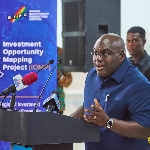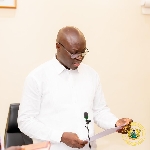BoG boss applauds GCB Bank; says it’s a strong indigenous bank
 GCB Bank
GCB Bank
The Bank of Ghana (BoG) has praised GCB Bank, describing it as a strong indigenous bank that provides invaluable financial services to the country.
BoG Governor, Dr. Ernest Addison, commended GCB Bank for its significant contributions to the socio-economic development of Ghana.
He highlighted the bank's active involvement in providing solutions during economic challenges that the nation has faced over the years.
Dr. Addison emphasised that throughout its seven decades of existence, GCB Bank has remained committed to its mandate of supporting the government and indigenous private enterprises.
The BoG boss, speaking through Dr. Maxwell Opoku-Afari, the First Deputy Governor of the Central Bank, lauded GCB Bank for overcoming significant challenges and successfully rebranding from Ghana Commercial Bank to GCB Bank. He praised the bank for maintaining its leadership position in the highly competitive banking environment with resilience.
Dr. Addison also recognized GCB Bank's strong financial performance, particularly in terms of asset growth and deposit mobilisation. During the financial sector clean-up exercise in 2017, GCB Bank acquired selected assets and liabilities of two indigenous banks. The bank further expanded its branch network to over 185 and increased its ATMs to 340, solidifying its position as a dominant player in Ghana's banking industry.
The occasion for the commendation was the celebration of GCB Bank's 70th anniversary on the theme: '70 years of providing unrivalled financial solutions towards socio-economic development of Ghana.'
Read Dr Addison’s full address below:
ADDRESS BY DR. ERNEST ADDISON GOVERNOR, BANK OF GHANA PRESENTED BY DR. MAXWELL OPOKU-AFARI FIRST DEPUTY GOVERNOR, BANK OF GHANA
1. Thank you for the kind invitation to join you today at this Grand Launch of GCB Bank’s 70th Anniversary Celebrations, under the theme, ‘70 years of providing unrivalled financial solutions towards socio-economic development of Ghana’. It is indeed a joyous occasion and over the past seven decades, GCB Bank has stood out as a strong indigenous bank, rendering invaluable financial services to this country. Established as the Bank of the Gold Coast in 1953, GCB Bank has, over the past 70 years, expanded organically and now provides top-notch electronic banking services and products that are unique, reliable, and convenient to customers. More importantly, these value-added services have supported Ghana’s broader agenda of financial deepening and inclusion.
2. Today, as we chronicle the key achievements of GCB Bank, Mr Chairman, let us appreciate the founding fathers of the bank, the past and current management, and staff of GCB Bank PLC for their sense of duty, commitment and dedication that has brought the bank this far. Indeed, GCB Bank has played significant roles in promoting the socio-economic development of the country. At various points in the nation’s history, the bank has been called to action to help with solutions during economic challenges that confronted the nation. Suffice it to say that over the last seven decades of its existence, the GCB Bank has delivered on its mandate of supporting government as well as indigenous private enterprises.
3. Mr. Chairman, over the period of its existence, GCB Bank has surmounted significant challenges, rebranded from Ghana Commercial Bank to a new image of GCB Bank, and with resilience, maintained its position as a leader in the competitive banking environment. These positive developments have been accompanied by strong financial performance, especially in asset growth and deposit mobilisation. In 2017, when the financial sector clean-up exercise was underway, GCB Bank acquired selected assets and liabilities of two indigenous banks and expanded its branch network and ATMs to over 185 and 340, respectively, to continue being the most dominant player in Ghana’s banking industry.
History of GCB Bank.
4. Ladies and Gentlemen, GCB Bank is indeed the oldest indigenous bank in Ghana. Its establishment dates back to 1947, when there were proposals from leading politicians in the then Gold Coast for the establishment of a national bank with central banking functions. In 1949, a select committee of the Legislative Assembly was appointed to investigate the establishment of a national bank with purely central banking functions. In 1951, the government appointed Sir Cecil Trevor to examine the question of setting up a national bank on commercial lines to finance development projects and to act as a reserve bank and to provide clearing house services. Based on his recommendation, a state-owned commercial bank was established in 1952 by the Bank of the Gold Coast Ordinance. The new Bank which was named Bank of the Gold Coast now GCB Bank started Operations in 1953.
5. In 1953, the Bank of the Gold Coast was set up by the Government and headed by Alfred Engleston, formerly of the Bank of England. Eventually the Bank was split into two: the Bank of Ghana, operating as a bank of issue, to be developed into a complete central bank; and the Ghana Commercial Bank, to be developed into the largest commercial bank with a monopoly on the accounts of public corporations. GCB Bank, then Bank of the Gold Coast, started operations with 27 employees. Initially, it focused on serving Ghanaian traders, farmers, and business people, who could not obtain financing from the expatriate banks.
6. In July 1957, after Ghana gained independence, Alfred Engleston was appointed as the first Governor of the Bank of Ghana. As expected, the Bank of Ghana took over the management of the currency and in July 1958 issued its first National Currency - the Cedi - to replace the old West African currency notes. The Bank of the Gold Coast was re-branded to Ghana Commercial Bank, after Ghana attained Independence. The 3 bank assumed the role and functions of Government bankers and began to take over the finances of most Government departments and public corporations.
7. The bank was wholly owned by the Government of Ghana. However, in 1996, when government shareholding stood at 51.17%, the shares of the bank was listed on the Ghana Stock Exchange. Currently, government ownership stands at 21.36%, while institutional and individual holding adds up to 78.64%. In 2013, the bank renamed itself GCB Bank Ltd, with a new brand identity which was launched at the end of 2014. Today, GCB Bank Ltd serves the banking needs of large corporations, parastatal companies, small and medium enterprises as well as individuals. From the one branch of the 1950s, GCB Bank now has over 150 branches and 11 agencies throughout the country
8. The bank posted a return on equity of 21.7 percent in 2022, despite the challenging macroeconomic environment. Additionally, the bank’s loans and advances market posted a balance of GH¢5.7 billion, representing 9.4 percent share of the total loans and advances market. Indeed, as at end-May 2023, the bank’s share of loans and advances stood at 10.4 percent, making GCB Bank the second largest issuer of loans and advances to the public and private sectors of the Ghanaian economy.
9. On loans to households, GCB Bank came first with a share of 18.6 percent of the total household loans granted by the banking industry at end-May 2023. Thus, the bank does not only provide financial intermediation to benefit households, but also supports government with a share of 12.1 percent of the industry’s total net investment in government securities at end-May 2023. Concerning safety, soundness, and resilience, GCB Bank compares favourably with the banking industry’s average, given its size and the level of financial intermediation. The bank’s Capital Adequacy Ratio (CAR) stood at 17.0 percent as of May 2023, well above the regulatory prudential minimum of 10.0 percent and above the industry’s average of 14.6 percent. It is of little surprise that GCB Bank is rated Ghana’s safest bank by Moody’s, Fitch, Standard & Poor’s, and the most compliant Bank in Africa by the Association for Certified Compliance Professionals in Africa (ACCPA).
10. It is also refreshing to note that GCB Bank has taken cyber security issues very seriously, with some major milestones. These include being the first financial institution in Ghana with a Security Operations Centre (SOC) to become a full member of the Forum for Incident Response and Security Teams (FIRST). The bank has also successfully deployed a world class SOC running on a 24x7 basis, successfully integrated the bank’s SOC with the Bank of Ghana’s SOC, and finally, acquired ISO 27001 and PCI-DSS certifications.
11. In the drive towards innovation, GCB Bank launched Ghana’s first bank-led mobile money service, that is, G-Money, which currently serves more than 2.7 million customers with services such as money transfer, bill payments, etc. All these strides have earned the Bank recognition, including being adjudged the top financial services firm at the 2022 Ghana Club 100 Awards. The Bank ranked first in the banking sector and tenth in the list of 100 topmost prestigious companies in Ghana. Although GCB Bank placed 10th in the overall 100 best companies operating in Ghana at the 2022 Ghana Club 100 Awards, it was the only bank and financial institution among the first10 best companies in Ghana. We applaud the entire Management Team and Staff of GCB Bank for the hard work in attaining this feat.
12. Mr. Chairman, GCB Bank has remained a key facilitator of Ghana’s international trade with dealings in letters of credit, financing medium-term loans, forward contracts, export credit guarantee lines, among others. In 2022, for instance, the bank tripled its net trading income to GHȼ487.2 million, from GHȼ157.5 million in 2021. In March 2023, GCB Bank successfully completed the first Pan-African Payment and Settlement System (PAPSS) client transaction in Ghana, which involved a Ghanaian incorporated entity initiating a supplier payment from GCB in Ghana Cedis to a beneficiary in Nigeria who received the payment in Naira instantly. This innovation cements GCB’s critical role in promoting trade with other Africa countries under the AfCFTA. GCB remains committed to providing innovative and efficient banking solutions to its customers such as the e-wallet, e-payments, and cashless banking to the market.
13. In addition, GCB Bank has set up a strong corporate social responsibility framework, providing support to various sectors of the economy, such as education, health, culture, tourism, sports, and the environment. Through its CSR activities, the bank has 5 extended support to the Ghana Navy and was at the forefront of the COVID-19 fight with donations to the National Response Team through the Ministry of Health.
14. Mr. Chairman, it is evident that the Ghanaian economy is currently undergoing some adjustments, which calls for innovation and creativity in business conduct, especially in the banking sector. The Domestic Debt Exchange Programme (DDEP) affected profitability and solvency of banks in 2022, but performance of banks during the first half of 2023 looks promising. The Bank of Ghana has also granted some temporary regulatory reliefs to dampen the impact of the debt restructuring and these, together with the expected operationalization of the Ghana Financial Stability Fund, should provide adequate support to the banking sector. Furthermore, banks whose CAR levels have dropped below the 10 percent minimum due to the DDEP have been advised to provide recapitalisation plans for review.
15. In this direction, I must congratulate the shareholders of GCB Bank on agreeing to allow the bank to raise additional capital of GHȼ1.0 billion to:
• meet regulatory capital adequacy ratio requirements;
• enhance the bank’s deal-making capacity and take advantage of opportunities available to the Bank while preserving the bank’s core strengths;
• strengthen access to funding markets and bolster confidence in the bank; and
• support targeted and prioritized investment in digital transformation and ultimately help to drive the bank’s business strategy.
16. Mr. Chairman, I believe GCB Bank will surmount all the emerging economic and financial challenges, given the collaboration between the regulator, on the one hand, and directors and shareholders of GCB Bank, on the other hand.
17. On this note, I extend my warm felicitations to the Board, Management and Staff of GCB Bank on your 70th Anniversary celebrations. I wish you all joyous celebrations!
Thank you very much for your attention.
Trending Business

MDF board inaugurated to champion community-centred growth in mining areas
00:56
ADB hosts health walk to mark 60th anniversary
11:12
Anchor 24-hour economy on agriculture and manufacturing -GFL to gov't
01:07
COCOBOD board chair pledges modernisation to support 24-hour economy policy
04:05
Banking sector clean-up: Ex-NPP Youth Organiser refutes Frank Adu's claims, says sector stronger than ever
11:02
Agric Minister woos Turkish tractor manufacturer to set up plant in Ghana
10:41
Gov't to establish farms in all Senior High Schools – Agric Minister reveals
10:07
Chief of Staff launches GIPC's investment mapping project to spur inclusive growth
08:36
President Mahama proposes aviation partnership with Portugal to reestablish Ghana’s national airline
14:04
Gov't to capitalise Agricultural Development Bank in 2026 – Finance Minister
02:49




